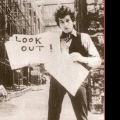Suche in der Medien-DB
La chinoise
alternativer Titel: Die Chinesin
Bewertung
imdb
mh-Community
Schlagworte
noch keine
Aktionen
Als eingeschaltener Nutzer könntest Du hier in Aktion treten| Schauspieler | Typ | mh |
|---|---|---|
| Anne Wiazemsky | Person | |
| Jean-Pierre Léaud | Person | |
| Juliet Berto | Person | |
| Michel Semeniako | Person | |
| Lex De Bruijn | Person | |
| Omar Diop | Person | |
| Blandine Jeanson | Person | |
| Francis Jeanson | Person | |
| Eliane Giovagnoli | Person |
| Regisseur | Typ | mh |
|---|---|---|
| Jean-Luc Godard | Person |
In Listen
- 13 Filme des Jahres 1967 (Christian_alternakid)
Gesehen von
Auf der Watchlist von
keinem Motorjugendlichen. Hallo, wie das?Aus den Jahren

Platz 13 von 28 :: Filme des Jahres 1967
Godards "La Chinoise" oder "Linksradikales Pamphlet - Der Film".Selbst für den Godard der späten 60er ist "La Chinoise" außergewöhnlich politisch und gesschwätzig. Aus einfachsten Mitteln, aber mit dem Godard'schen Händchen für Farben, Stil und Pop, entwickelt er hier eine Diskussion über den Zustand linker Politik in den ausgehenden 60ern. Besonders bemerkenswert ist natürlich dass "La Chinoise" ein Jahr vor 1968 gedreht wurde und so ein unschätzbarer Snapshot für die Befindlichkeiten und Gedanken der jungen Generation vor dem Aufruhr ist. "La Chinoise" erzählt mehr über die Geschehnisse von Frankreich im Mai 68 bis zur RAF in Deutschland als jede zurückblickende Dokumentation es seitdem vermochte.
Pauline Kael, die zu meiner Überraschung von "La Chinoise" begeistert war, schreibt ganz richtig: "We don’t have time to catch up with the future that is here, and Godard is already making movie critiques of it—documentaries of the future in the present. (...) LA CHINOISE is a satire of new political youth, but a satire from within, based on observation, and a satire that loves its targets more than it loves anything else—that, perhaps, can see beauty and hope only in its targets. But not much hope. (...) At this point, it would be easy for him to court popularity (...) by making his revolutionaries romantic, like the gangster in BREATHLESS. Romantic revolutionaries could act out political plots instead of robberies. But he does not invest the political activists of LA CHINOISE with glamour or mystery, or even passion. His romantic heroes and heroines were old-fashioned enough to believe in people, and hence to be victimised; the members of Véronique’s group believe love is impossible, and for them it is. Godard does just what will be hardest to take: he makes them infantile and funny—victims of Pop culture. And though he likes them because they are ready to convert their slogans into action, because they want to do something, the movie asks, “And after you’ve closed the universities, what next?”
Kommentare
Kommentieren
Um zu kommentieren, muss man eingeschaltenes Mitglied der motorjugend sein.Die Medien-Datenbank verwendet die TMDb API, steht aber in keiner Verbindung zur TMDb oder ist von dieser in irgendeiner Weise zertifiziert.


Christian_alternakid am 15.10.2021 um 09:56 Uhr:
Godards "La Chinoise" oder "Linksradikales Pamphlet - Der Film". Selbst für den Godard der späten 60er ist "La Chinoise" außergewöhnlich politisch und gesschwätzig. Aus einfachsten Mitteln, aber mit dem Godard'schen Händchen für Farben, Stil und Pop, entwickelt Godard hier eine Diskussion über den Zustand linker Politik in den ausgehenden 60ern. Besonders bemerkenswert ist natürlich dass "La Chinoise" ein Jahr vor 1968 gedreht wurde und so ein unschätzbarer Snapshot für die Befindlichkeiten und Gedanken der jungen Generation vor dem Aufruhr ist und mehr über die Geschehnisse von Frankreich im Mai 68 bis zur RAF in Deutschland erzählt als jede zurückblickende Dokumentation.Pauline Kael, die zu meiner Überraschung von "La Chinoise" begeistert war, schreibt ganz richtig: "We don’t have time to catch up with the future that is here, and Godard is already making movie critiques of it—documentaries of the future in the present. (...) LA CHINOISE is a satire of new political youth, but a satire from within, based on observation, and a satire that loves its targets more than it loves anything else—that, perhaps, can see beauty and hope only in its targets. But not much hope. (...) At this point, it would be easy for him to court popularity (...) by making his revolutionaries romantic, like the gangster in BREATHLESS. Romantic revolutionaries could act out political plots instead of robberies. But he does not invest the political activists of LA CHINOISE with glamour or mystery, or even passion. His romantic heroes and heroines were old-fashioned enough to believe in people, and hence to be victimised; the members of Véronique’s group believe love is impossible, and for them it is. Godard does just what will be hardest to take: he makes them infantile and funny—victims of Pop culture. And though he likes them because they are ready to convert their slogans into action, because they want to do something, the movie asks, “And after you’ve closed the universities, what next?”